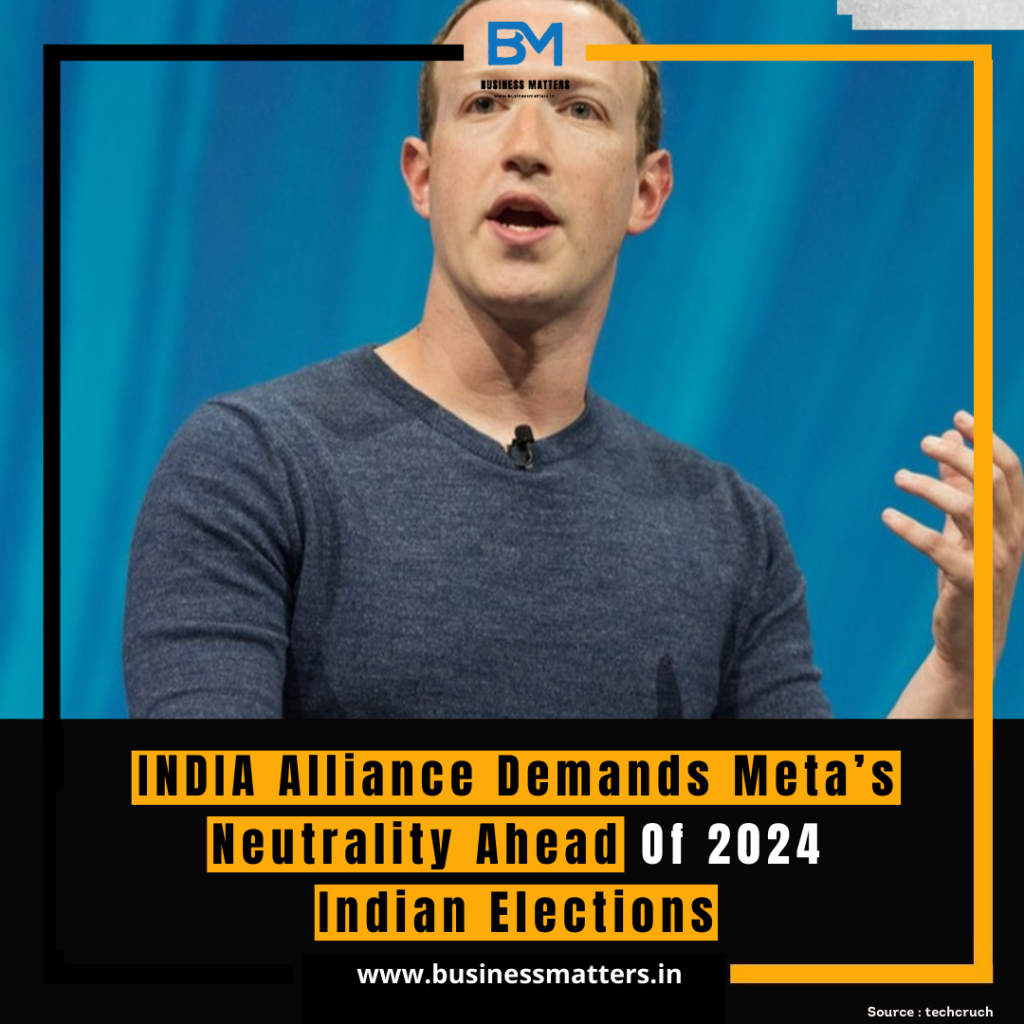
INDIA Alliance Demands Meta’s Neutrality Ahead Of 2024 Indian Elections
INDIA Alliance Demands Meta’s Neutrality Ahead Of 2024 Indian Elections
New Delhi, India – On Friday, October 13, 2023, the INDIA Alliance, a coalition of over 50 civil society organizations, released a report demanding that Meta, the parent company of Facebook, Instagram, and WhatsApp, commit to neutrality ahead of India’s 2024 general elections.
The report, titled “Meta’s Role in India’s Elections: A Call for Neutrality,” alleges that Meta has failed to take adequate steps to prevent the spread of misinformation and hate speech on its platforms, which could have a significant impact on the outcome of the 2024 elections.
In particular, the report highlights the following concerns:
- The spread of misinformation and disinformation on Meta’s platforms: Meta has a history of failing to take down misinformation and disinformation on its platforms, especially in the context of elections. For example, during India’s 2019 general elections, Meta was found to have allowed the spread of misinformation about the electoral process and about the candidates.
- The use of Meta’s platforms to spread hate speech: Meta’s platforms have also been used to spread hate speech and to incite violence against marginalized groups. For example, during India’s 2019 general elections, Meta was found to have allowed the spread of hate speech against Muslims and other minorities.
- The lack of transparency and accountability in Meta’s content moderation practices: Meta has been criticized for its lack of transparency and accountability in its content moderation practices. For example, it is not clear how Meta decides which content to remove and which content to allow to remain on its platforms.
The INDIA Alliance’s report calls on Meta to take the following steps to ensure neutrality ahead of India’s 2024 general elections:
- Increase transparency and accountability in its content moderation practices: Meta should make its content moderation policies and procedures more transparent and accountable. For example, it should publish a regular transparency report that details the types of content it removes and the reasons for removal.
- Invest in more resources to combat misinformation and hate speech: Meta should invest in more resources to combat the spread of misinformation and hate speech on its platforms. For example, it should hire more content moderators and develop new tools and technologies to identify and remove harmful content.
- Work with civil society organizations to monitor and address election-related abuses: Meta should work with civil society organizations to monitor and address election-related abuses on its platforms. For example, it should establish a dedicated channel for civil society organizations to report harmful content.
The INDIA Alliance’s report is the latest in a series of calls for Meta to do more to prevent the spread of misinformation and hate speech on its platforms. In recent years, Meta has been criticized by governments, regulators, and civil society organizations around the world for its failure to adequately address these problems.
Meta has responded to these criticisms by stating that it is committed to addressing the spread of misinformation and hate speech on its platforms. However, the company has not yet taken any concrete steps to address the concerns raised in the INDIA Alliance’s report.
It remains to be seen whether Meta will heed the INDIA Alliance’s call for neutrality ahead of India’s 2024 general elections. If Meta fails to take action, it could have a significant impact on the outcome of the elections.
Impact on the 2024 Indian elections
The spread of misinformation and hate speech on Meta’s platforms could have a significant impact on the outcome of India’s 2024 general elections.
Misinformation can mislead voters and influence their voting decisions. For example, during India’s 2019 general elections, there was a widespread campaign to spread misinformation about the electoral process. This misinformation led to confusion and chaos on Election Day, and it may have prevented some voters from casting their ballots.
Hate speech can also have a significant impact on elections. Hate speech can create a climate of fear and intimidation, and it can discourage people from participating in the electoral process. For example, during India’s 2019 general elections, there was a widespread campaign to spread hate speech against Muslims and other minorities. This hate speech led to violence and intimidation, and it may have prevented some people from voting.
If Meta does not take steps to address the spread of misinformation and hate speech on its platforms, it could have a significant impact on the outcome of India’s 2024 general elections.
Conclusion
The INDIA Alliance’s report is a timely reminder of the important role that Meta plays in India’s democracy. Meta’s platforms are used by hundreds of millions of Indians, and they have the potential to influence the outcome of elections.
Meta has a responsibility to ensure that its platforms are used to spread information and ideas, not misinformation and hate speech.

